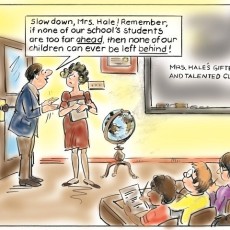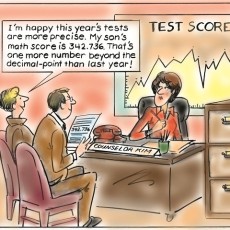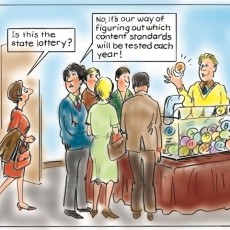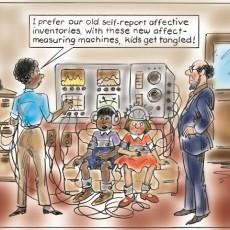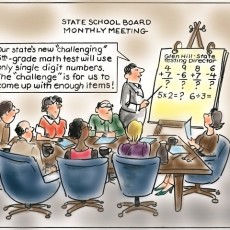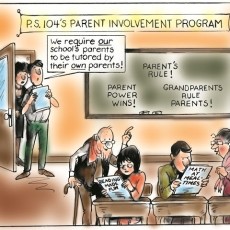W. James “Jim” Popham

W. James “Jim” Popham is Emeritus Professor in the Graduate School of Education at the University of California, Los Angeles (UCLA). Also a former high school teacher, Popham has dedicated nearly three decades to teacher education. Having taught courses in instructional methods for prospective teachers and graduate courses in evaluation and measurement, he has received several distinguished teaching awards including recognition by UCLA Today as one of the university’s top 20 professors of the 20th century. He also established IOX Assessment Associates in 1968 through which he conducted research and created tests for at least a dozen states. As the former president of the American Educational Research Association and founding editor of the association’s quarterly journal, Educational Evaluation and Policy Analysis, Popham also received the Award for Career Contributions to Educational Measurement (2002) from the National Council on Measurement in Education and a Certificate of Recognition (2006) from the National Association of Test Directors. Having written more than 30 books, 200 journal articles, 50 research reports, and 175 papers for presentation, Dr. Popham’s more recent publications include: Unlearned Lessons (2009), Classroom Assessment: What Teachers Need to Know, 6th Edition (2011), and Mastering Assessment (2012).
For more information, visit Jim Popham’s Website. To learn about Jim Popham from his family and friends, visit his Reflections. To view photographs and cartoons from Jim Popham’s personal collection, visit his Photo Gallery.
Curriculum Vitae Suggested readingsVisit the video below to watch a short overview of the interview with Jim Popham. Otherwise, see all three of the full interviews with Jim Popham below.
Video Interviews with W. James “Jim” Popham:
Growing up as an only child in Portland, Oregon, Dr. W. James Popham graduated from college with honors although he admittedly “never really thought about what [he] wanted to do” afterwards. Choosing to become a high school English and social studies teacher, his desire to improve teacher instruction prompted his decision to attend graduate school and, related, his life-long commitment to teacher education. Initially uninterested in courses on assessment, Popham soon realized that “those who control the test control the whole game” in education. This realization shaped his career for the next 30 years. Watch this clip to enjoy Dr. Popham’s great sense of humor and hear the stories his colleagues and students remember most fondly.
Having spent countless hours working with “real world” educators, Dr. W. James Popham insists that teachers, parents, and students must all become more knowledgeable about the potential risks and benefits of tests. Concerned that “the caliber of schooling in this country is less than it should be,” Popham believes that the wrong kinds of tests compel teachers to focus valuable instructional time on test preparation. Having observed the disastrous effects of current education policies, he now cautions educators and policy makers against repeating the same mistakes. In this clip, learn more about Dr. Popham’s latest research and share his hope for future educational reform.
Praised for his “passion for the improvement of education and respect for the work of teachers,” Dr. W. James Popham explains one of his greatest fears for the future of education, namely the inappropriate evaluation of educators. Having developed tests in more than a dozen states, he continues to search for occasions to support teachers and increase student learning. As the recipient of numerous awards and honors including recognition as one of the top 20 educators in the 20th century at the University of California, Los Angeles (UCLA), Popham jokingly notes that in his life he is most proud of his crowning as the Rose Festival Prince while attending elementary school in Portland, Oregon. Watch this to clip to learn about Dr. Popham’s happiest time in his career.
Amrein-Beardsley, A. (2012, April 21). Inside the Academy video interviews with Dr. W. James Popham [Video files]. Retrieved from /inside-the-academy/w-james-jim-popham
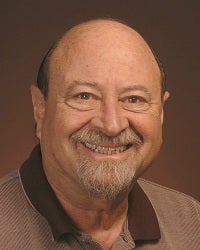
Dr. David Berliner
Having first met Dr. W. James Popham as a young graduate student, Dr. David Berliner “began as an admirer of Jim” for his “national charge to develop behavioral objectives,” a movement that both hoped would fundamentally change education. Recalling his excitement at the opportunity to chauffeur the well-known professor from the airport to a scholarly debate, David fondly refers to his early role model as “Mr. Jim.” Although mutually disappointed in the stagnant behavioral objectives movement, David explains that they “manage to work hard, and laugh hard at life and each other,” adding that “you can’t ask for a better companion than that.” David also describes their collaboration through the Commission of Instructionally Supportive Assessment, recalling his excitement when dubbed a “commissioner” by his friend. Adding that “the cheapskate never gave him his commissioner’s badge,” David praises Jim as a leader in the field. David adds that while “many leaders in the field are smart,” Jim is witty, hard-working, well-published, “committed to a better education system,” and “always optimistic that things can be made better.” Jim is unique in that “all of these attributes are in a single person.” Remembering the satirical exposés organized by Jim for the American Educational Research Association meetings, David describes his own fright when asked to present at the Triennial Travesties. “In addition to a lifetime of trying to make education better,” David explains that “these follies are Jim’s gift to the research community, a way to be sure that none of us takes any of us too seriously, while we do very serious business.”
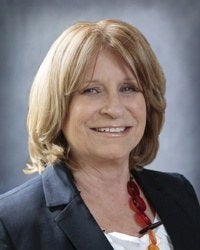
Dr. Eva Baker
Dr. Eva Baker first worked as an undergraduate reader for a course taught by Dr. W. James Popham at the University of California, Los Angeles, even changing her major to Education once in graduate school to continue to work as his assistant. Describing her mentor as “crazily productive,” Eva adds that she “memorized his lectures, including content and details, like emphasis, gestures, and throat clearings” over the course of the next three years. Fondly recalling the April Fools jokes that they played on Teacher Education students (usually about their midterm grades), Eva describes his popular course, based on a paradigmatic “science-fiction land called KAPIGA where teachers were responsible for student learning.” Prepared to throw fake boulders at students who were not paying attention, Jim also printed and distributed “his own bumper stickers saying ‘Help Stamp Out Non-Behavioral Objectives,’ a slogan both thought was hilarious and properly obscure.” Eva also recalls shared family outings to the beach and basketball games. Frequently playing competitive bridge, she notes that Jim was “an expert at that” and happy to have “an opportunity to win.” While she taught her friend and colleague “about Lenny Welch, Tommy James, the Stones, Santana, MOMA, and obscure literary allusion,” Eva always appreciated Jim’s professional advice, namely that she should not “continue to wear jeans to school” if she ever hoped to earn tenure. She explains that “he taught her the fundamentals underlying much of what she thinks” and that for many in her generation the key question remains: “Where were you when President Kennedy was killed?” Representative of their long-time friendship, Eva replies that she “was with Jim Popham observing Teacher Education students in a junior high school.”
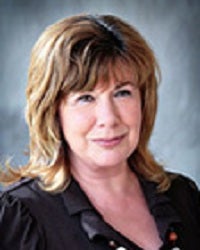
Dr. Margaret Heritage
Dr. Margaret Heritage describes her friend and mentor Dr. W. James Popham as “great fun to be around,” explaining that she “values immensely the guidance he provides to her about her work.” She adds that she “feels fortunate to have such a brilliant and wise mentor.” Recalling a workshop presentation at a European conference on assessment, Margaret describes the “very lavish dinner [held] in the evening at a small palace with dancing afterwards to the tunes of a rock band.” Margaret admits that she did not expect Jim to dance given the late hour-she was very surprised when he “took to the dance floor, showing what a mean dancer he is…even outpacing those who were much younger!” Jim was treated like a “rock star” at the European conference, according to his friend Margaret who notes that many “lapped up everything that he said.” Praising him for “ground[ing] assessment in the context of teaching,” Margaret explains that Jim “cares about teachers and children and wants what’s best for them.” Jim “makes complex issues in assessment digestible for teachers and has made a significant contribution to both teachers’ understanding and use of assessment.” Characterizing Jim as “a trusted friend who is honest and never says anything he doesn’t mean,” Margaret describes him as “one of the funniest people she knows [whose] sharp wit is second to none.” She praises her friend and mentor as a professional: “Jim genuinely cares about what happens to teachers and students and his work attests to that.”
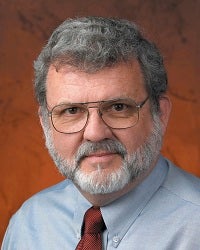
Dr. Joe Ryan
Having worked with Dr. W. James Popham on a wide variety of activities since 1978, Dr. Joe Ryan has “discussed numerous projects [with his friend] over the years” often presenting and writing together on issues related to measurement advice for practitioners. Fondly recalling his own Triennial Travesties presentation at the American Educational Research Association meeting in 1996, Joe describes Jim’s key role in the satirical exposé. Using hats “to show metaphorically the issues in adaptive assessment,” Jim was called upon to act as one of the students, first donning a very small hat to represent an easy test item. By the end of the presentation, Jim wore “a size 52 long suit coat and fake glasses with bushy eyebrows and a big nose.” A Dr. Seuss, Cat in the Hat, red and white striped hat completed the ensemble. Joe adds that “this should have been an image for all time” but insists that “Jim hired a private detective firm [that] tracked down and destroyed every picture and video of this event.” Surprised by Joe’s impromptu invitation to join the presentation, Jim “was a very good sport through it all!” Teasing that Jim is most proud of his crowning as Prince of the Rose Festival in elementary school, Joe also praises his friend for his significant professional contributions, explaining that “Jim constantly, effectively, and importantly brings the discussion of measurement and assessment back to the central issues of effective instruction and student learning.” Joe characterizes his long-time friend as “the consummate educator, ever focused on the need to be clear and sensible in defining what we want students to learn [while also] recognizing the proper and most useful role of assessment.”
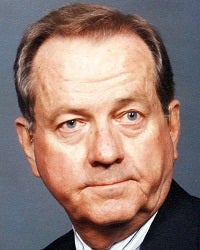
Dr. Paul Sandifer
Describing his long-time friend and colleague Dr. W. James Popham as “highly intelligent, energetic, professional, ethical, and master of the bon mot,” Dr. Paul Sandifer adds that he is “just like the energizer bunny…[he] just keeps on going.” Paul and Jim first meet in 1978 while working together to develop a legislatively mandated state-wide testing program in South Carolina. Also collaborating as members of the Commission on Instructionally Supportive Assessment and the Technical Advisory Committee for the Wyoming assessment program, Paul adds that he is pleased to be able to call Jim “My Friend.” Having teased Paul for his seemingly slow Southern drawl, Jim is the “master of quick comebacks,” according to his friend. Paul also describes Jim as a “prolific writer,” recalling an incident during which Jim mentioned that he had another book ready for publication. In response, Paul teased his friend that “perhaps he should slow down on writing books since he is now professor emeritus and could no longer require his students to purchase them.” Additionally, Paul praises his long-time colleague for his “many significant contributions to education in general and to educational measurement in particular.” Paul notes that Jim’s “continued work to link instruction and assessments so that assessment results are meaningful to and useful for teachers, students and parents has literally impacted thousands of students throughout this country.” While Jim has trained other educators and researchers as well as positively influenced his readers through numerous publications, Paul insists that “the end game in all of this is what happens with/to students.” Jim continues to ask the most important question: “How do you use assessment to improve instruction?”
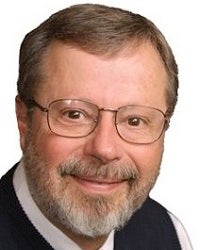
Dr. Rick Stiggins
Describing his friend and colleague Dr. W. James Popham as “a rare ‘approachable’ super star,” Dr. Rick Stiggins recalls having lunch “just to explore ideas, possibilities, and opinions.” He also recalls introducing Jim at a conference shortly following his friend’s hip replacement surgery. In an effort to “keep him humble,” Rick admits that he “made some wise cracks” about Jim’s lack of hair. Slowly moving to the podium still on crutches, Jim “pointed out that even at his age, he remains very, very cool…that is artificially hip.” Characterizing Jim as “the entertainer,” Rick describes a speech given by his friend on classroom level assessment. Throughout the presentation, Jim routinely “held up a cardboard sign saying in big block letters: CLASSROOM ASSESSMENT,” explaining that Rick had instructed him to frequently mention the topic. The audience continued to laugh every time Jim held up his sign! Noting that “the list of folks who are able to connect [instruction and assessment] in truly productive ways-is a very short list,” Paul explains that Jim’s “major contributions reside…in forming and teaching others about those linkages.” In addition, “Jim has not been trapped by a particular version of excellence in assessment as have so many in the measurement community.” Jim is “constantly out on the edge striving to see assessment through new eyes.” Even when he has been wrong, Paul notes that Jim “has openly revised his thinking.” In fact, “this is the part of Jim the teacher that captured [Paul’s] attention early on and after which [he] has tried to model [his] career.” Paul adds that “many others would say the same.”
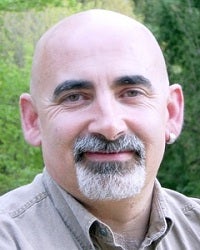
Dr. Dylan William
First encountering Dr. W. James Popham in 1999 at the Triennial Travesties, a satirical exposé presented at the American Educational Research Association meeting, Dr. Dylan William recalls that he was “stunned by the irreverent attitudes of the host to his professional peers and in awe of his verbal dexterity.” Sharing dinner and countless emails over the years, Dylan adds that he “has yet to read an email [from his friend] that has not put a smile on [his] face.” He jokingly adds that “Jim has realized that once a man is past adolescence, the only way to look really cool is to shave one’s head and grow a goatee.” Dylan also describes Jim’s most significant professional achievement as “the way that he combines passion for the improvement of education with a respect for the work of teachers.” Challenging Dylan to “clarify and simplify his ideas so as to make them more accessible to teachers,” Jim insists that “because of the demanding and busy nature of their work, teachers need us to do our very best work.” Dylan further explains that Jim never forgets that “the jargon we [as educational researchers] use to communicate with each other allows us to avoid thinking too hard about what we are really saying.” Dylan captures his friend’s greatest strength using the words of Albert Einstein: “Make things as simple as possible, but no simpler.”

